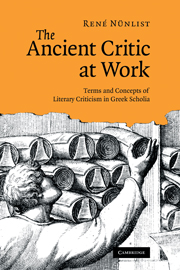Book contents
- Frontmatter
- Contents
- Acknowledgments
- Introduction
- PART I
- PART II
- 13 The gods in Homer
- 14 Homeric similes
- 15 Epithets
- 16 Type scenes
- 17 Homeric speeches
- 18 Reverse order
- 19 Staging, performance and dramaturgy
- Epilogue
- Glossary of Greek terms
- Editions of scholia
- Other abbreviations
- Bibliography
- Thematic index
- Index locorum
15 - Epithets
Published online by Cambridge University Press: 29 August 2009
- Frontmatter
- Contents
- Acknowledgments
- Introduction
- PART I
- PART II
- 13 The gods in Homer
- 14 Homeric similes
- 15 Epithets
- 16 Type scenes
- 17 Homeric speeches
- 18 Reverse order
- 19 Staging, performance and dramaturgy
- Epilogue
- Glossary of Greek terms
- Editions of scholia
- Other abbreviations
- Bibliography
- Thematic index
- Index locorum
Summary
The elaborate use of epithets is a distinctive feature of Homer's poetic style. Of the questions discussed in ancient scholarship, the most frequent is semantic in nature. A considerable number of Homer's epithets were no longer part of his readers’ passive vocabulary and needed to be explained. Consequently, the scholia – especially the D-scholia – regularly translate and/or explain the relevant epithet. Within the individual notes, there is a wide range from simple periphrasis (‘X means Y’) to detailed explanation (often based on etymology) and deduction from various dialects. For instance, the tree adjective βλωθρή (meaning uncertain, see LfgrE s.v.) is explained as follows:
τινὲς ἁπαλήν, κατὰ Ἀρκάδας· οἵ δὲ ὑψηλήν, κατὰ Βοιωτούς, ἢ ϕλοιοβαρῆ, κατὰ Μάγνητας, ἢ τραχεῖαν, κατὰ Δρύοπας, ἢ ηὐξημένην, κατὰ Τυρρηνούς, ἢ σκληράν κατὰ Καρυστίους.
(schol. AT Il. 13.390a1ex., sim. b)Some <say it means> ‘tender’, according to the Arcadians [i.e. in the Arcadian dialect], others ‘high’, according to the Boeotians, or ‘heavy with bark’, according to the Magnesians, or ‘prickly’, according to the Dryopians, or ‘grown’, according to the Tyrrhenians, or ‘hard’, according to the Carystians.
Although the semantic, etymological and dialectal explanations given in the scholia do not always stand up to modern scrutiny, they nevertheless form the natural starting-point for modern scholars. The Lexikon des frühgriechischen Epos, for example, recognises the importance of ancient semantics in that each lemma is preceded by relevant quotations from ancient sources (mostly D-scholia and scholia minora).
- Type
- Chapter
- Information
- The Ancient Critic at WorkTerms and Concepts of Literary Criticism in Greek Scholia, pp. 299 - 306Publisher: Cambridge University PressPrint publication year: 2009

